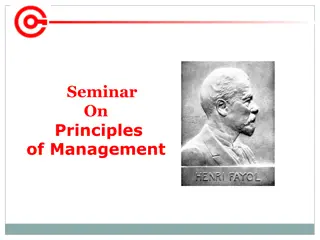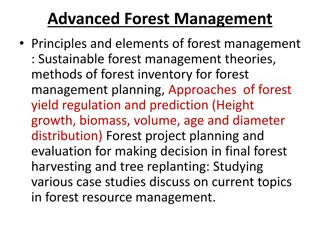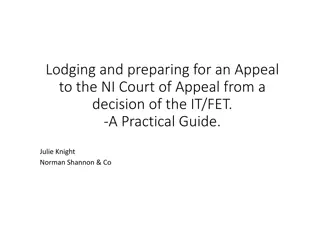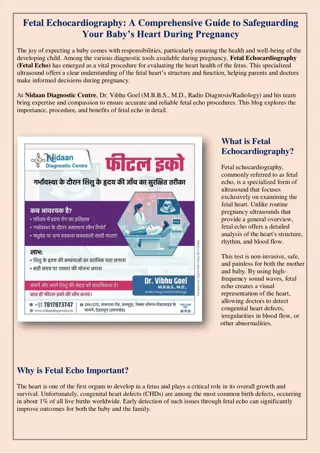ILO Fundamental Principles and Rights at Work
Explore the 5 fundamental principles and rights at work outlined by the ILO, emphasizing social justice and decent work. Delve into how these principles connect with ILO conventions and discuss challenges in their application to Pacific Island Countries.
0 views • 15 slides
Understanding Open Government Data Principles and Benefits
Open Government Data (OGD) principles and policies play a vital role in promoting transparency, citizen engagement, innovation, and data-driven decision-making in government operations. Governments worldwide are adopting open data policies to enhance accessibility, reusability, collaboration, privac
0 views • 36 slides
Principles of the Ghana Civil Service Code of Conduct
The Code of Conduct for the Ghana Civil Service, outlined by Elizabeth Obeng-Yeboah, emphasizes principles such as abiding by the constitution and laws with dignity, integrity, and professionalism. It sets standards for conduct, avoiding conflicts of interest, maintaining political neutrality, and u
1 views • 34 slides
InterManager's General Principles of Conduct and Action
InterManager, a prominent trade association in the shipping industry, has established General Principles of Conduct and Action to uphold ethical standards, promote safety, environmental protection, and continuous improvement. These principles guide members towards integrity, professionalism, and acc
2 views • 72 slides
Advocating Together for Academic Freedom - Importance and Principles
Advocating for academic freedom is crucial for the advancement of knowledge and quality education. The American Association of University Professors (AAUP) champions academic freedom, shared governance, and economic security for faculty members. The 1940 Joint AAUP/AAC&U Statement of Principles on A
4 views • 14 slides
Understanding the Core Principles of the 2030 Agenda for Sustainable Development
Explore the key features and principles of the 2030 Agenda for Sustainable Development with a focus on its core principles of Universality, Leaving No One Behind, Interconnectedness and Indivisibility, Inclusiveness, and Multi-stakeholder Partnerships. This comprehensive agenda encompasses 17 Sustai
5 views • 11 slides
Understanding Business Ethics Theories and Principles
Explore various business ethics theories including Ethical Concepts, Moral Behavior Development, Ethical Principles, and the Role of Ethics in Business. Delve into the concept of ethics, moral behavior evolution, ethical principles like autonomy, honesty, justice, and integrity, and the importance o
10 views • 17 slides
Academic Freedom and Shared Governance in Higher Education
Academic Freedom and Shared Governance are foundational principles advocated by the American Association of University Professors (AAUP) to ensure educators have the freedom to explore, research, teach, and discuss without censorship. These principles empower educators to enhance student learning an
0 views • 9 slides
Essential Principles of Management Discussed in Seminar
Explore the foundational principles of management discussed in a seminar on principles of management. Delve into topics such as division of work, authority, discipline, unity of command, and unity of direction as outlined by Henri Fayol. Gain insights into the importance of these principles for effe
0 views • 22 slides
Understanding Neuroplasticity: 10 Principles for Brain Rehabilitation
Explore the 10 principles of neuroplasticity for brain rehabilitation, including key concepts like "use it or lose it," specificity of exercises, and the importance of salience and intensity in therapy. Learn how practicing skills can strengthen neural connections and how therapists can help manage
6 views • 13 slides
Principles of Advanced Forest Management
Explore sustainable forest management theories, inventory methods, yield regulation approaches, and project planning for effective decision-making in forest resource management. Delve into the principles of forest management, land classification, growth projection, yield prediction, and sustainable
0 views • 26 slides
Counting Principles and Pigeonhole Principle Explained
Explore the concepts of counting principles and the pigeonhole principle through practical examples and tips. Learn how to apply these principles to solve problems effectively. From understanding basic counting rules to the advanced pigeonhole principle, this content provides insights and guidance o
1 views • 35 slides
Introduction of Electrical Transmission Braking Systems Workshop
The Special Interest Group on electrical braking systems is hosting a workshop to discuss the drafting principles, terminology, and indicators related to electrical transmission braking systems. The workshop aims to identify safety critical elements, propose amendments to UN Regulations, and make re
1 views • 29 slides
Principles of Architecture: Unity, Contrast, Mass Composition
Explore the fundamental principles of architecture focusing on unity, contrast, and mass composition. Unity emphasizes harmony among building elements, contrast adds interest without disrupting unity, and mass composition involves arranging shapes in a harmonious way. Proportion and scale play key r
0 views • 24 slides
Understanding Sports Training: Methods and Principles
Sports training is a systematic process aimed at enhancing performance and behavior through planned measures and organization. It involves physical exercises, scientific principles, and pedagogical strategies to improve skills and prepare athletes for competition. Key aspects include the use of prog
1 views • 14 slides
International Law of War: Nuremberg Principles and Accountability
The Nuremberg Principles, derived from the trials of Nazi officials for war crimes, establish accountability in international law. These principles hold individuals responsible for committing acts considered crimes under international law, regardless of their position or orders received. The assumpt
2 views • 22 slides
Promoting Ethical Principles in Social Science Research
Explore the challenges and strategies for translating and applying ethical principles, especially in emergency contexts. Learn key questions in social science research and how to ensure information contributes to community actions. Understand the importance of considering ethical principles in all w
0 views • 21 slides
Understanding the Differences and Characteristics of BJT and FET in Electronics
Learn about the disparities between Bipolar Junction Transistors (BJT) and Field-Effect Transistors (FET) in this informative content. Explore the construction, operation, and characteristics of these semiconductor devices, including N-channel JFET specifics, operating behaviors such as pinch-off, d
2 views • 9 slides
Understanding Radio Transmitters: Classifications and Types
This comprehensive guide delves into the world of radio transmitters, covering their classifications based on modulation, service involved, frequency range, and power used. Learn about different types of modulation transmitters, service-specific transmitters, carrier frequency-based transmitters, an
4 views • 26 slides
Study Guide for Principles of Management Course at Africa Research University (ARU)
Welcome to Africa Research University (ARU)! This study guide is designed to help you navigate through the Principles of Management course (Course Code: PRM4) at ARU. It provides an introduction to the course content, emphasizing the importance of developing management skills to effectively lead and
1 views • 40 slides
Bachelor of Education (Senior Phase and FET Phase) Consumer Studies Program
The Bachelor of Education (Senior Phase and Further Education and Training Teaching) program is a comprehensive qualification for educators preparing to teach grades 7-10. It integrates academic and educational subjects, emphasizing practical understanding, self-reflexivity, citizenship, diverse tea
0 views • 6 slides
Analysis of Low-Frequency Response in BJT and FET Amplifiers
This analysis delves into the low-frequency response of BJT and FET amplifiers, examining the impact of various components such as resistors and capacitors on the cutoff frequencies. Detailed examples illustrate the calculation process for determining these frequencies based on specific parameters.
0 views • 18 slides
Key Principles of Insurance Explained with Visuals
Understanding the principles of insurance is crucial for both insurance seekers and companies. The principles include Utmost Good Faith, Insurable Interest, Indemnity, Contribution, and Subrogation. These principles ensure transparency, fairness, and protection for policyholders. Visual representati
0 views • 6 slides
Understanding Field Effect Transistor (FET) and MOSFET Principles
Explore the construction, principles, characteristics, and relationships among parameters of Junction Field Effect Transistors (JFET) through detailed explanations and diagrams. Dive into the equation of drain characteristics and the resemblance to a parabolic curve. Understand the differentiation p
0 views • 9 slides
Principles of Training: Overload, Specificity, and Progression
Principles of training encompass overload, specificity, and progression. Overload requires doing more than usual, specificity involves tailored activities, and progression ensures gradual advancement. These principles are vital for improving fitness levels safely and effectively, emphasizing the nee
8 views • 17 slides
Effective Partnership and Mutual Accountability in Nutrition Clusters
The content discusses the minimum commitments needed for participation in Nutrition Clusters, explains the Principles of Partnership, and explores how these principles can enhance coordination and accountability to affected populations. It emphasizes partner commitments, such as leadership, mainstre
0 views • 7 slides
Joint Transnational Call (JTC) 2017 in Synergy with FET Flagships: Overview & Opportunities
The Joint Transnational Call (JTC) 2017, facilitated by FLAG-ERA, aligns transnational research proposals with the Graphene Flagship and Human Brain Project under the FET Flagships initiative. FLAG-ERA provides a framework for collaboration among National Organisations in Europe and beyond, supporte
0 views • 12 slides
Overview of Fundamental Principles of Space Law and Outer Space Treaties
The content discusses the fundamental principles of space law highlighted at the United Nations Space Law Conference 2020, focusing on key treaties such as the Outer Space Treaty of 1967 and associated rights, duties, and obligations of states in space exploration and use, including non-appropriatio
0 views • 16 slides
Federal Excise Tax (FET) On Trailers - GNS Accountancy
Understanding Federal Excise Tax (FET) on Imported Tractors and Trailers: A Guide for Trucking Companies
3 views • 5 slides
Overview of Directive Principles of State Policy in Indian Constitution
Directive Principles of State Policy (DPSP) in the Indian Constitution encompass social, economic, and political programs aimed at realizing ideals of justice, liberty, equality, and fraternity. They are non-justiciable but guide the state in legislative matters. Classified into Socialistic, Gandhia
0 views • 24 slides
Exploring Career Options and Education Pathways in Ireland
Discover the valuable skills for modern careers, insights on career guidance, the role of the National Centre for Guidance in Education in Ireland, and opportunities in Further Education and Training (FET). Explore diverse full-time and part-time FET courses, progression routes, and the support avai
0 views • 13 slides
Understanding FAIR Principles in Biomedical Research
The FAIR principles - Findable, Accessible, Interoperable, and Reusable - provide a framework for ensuring scientific data in biomedical research is managed and shared effectively. This informative session delves into the theory and practice of FAIR principles, emphasizing the importance of data qua
0 views • 28 slides
The FAIR Principles for Data Management and Stewardship
Embrace the FAIR principles - Findable, Accessible, Interoperable, Re-usable - for effective scientific data management and stewardship. Learn how annotations enhance data FAIRness and the key attributes of each principle. Dive into the high-level guiding principles that ensure data is globally uniq
0 views • 25 slides
Understanding the Guiding Principles for Evaluators
This content provides insights into the Guiding Principles for Evaluators, including their history, assumptions, and key principles such as Systematic Inquiry and Competence. The workshop aims to increase knowledge about ethical evaluation practices and stimulate discussions within the evaluation co
0 views • 22 slides
Guiding Principles for GETSI/INTEGRATE Webinar – Materials Development and Goals
The webinar presented by David Steer from the University of Akron focuses on guiding principles for material development in the context of GETSI/INTEGRATE modules. It outlines goals for the session, including discussing components of the guiding principles, examples of meeting those principles, and
0 views • 13 slides
Understanding Henri Fayol's 14 Principles of Management
Henri Fayol, the Father of Modern Management, introduced 14 Principles of Management in 1916, outlining essential guidelines for effective management. These principles cover areas such as division of work, authority and responsibility, discipline, unity of command, and unity of direction. By followi
0 views • 19 slides
Principles of Management: Understanding Henri Fayol's 14 Key Principles
Explore the foundational principles of management through the lens of Henri Fayol's 14 key principles, which offer valuable insights into managerial decision-making and organizational interactions. Delve into the history of Henri Fayol, his contributions to management theory, the concept of authorit
0 views • 14 slides
Legal Principles of Insurance
The legal principles of insurance include indemnity, insurable interest, subrogation, and utmost good faith. These principles ensure fair compensation, financial risk protection, and honesty in insurance contracts. Understanding these principles is crucial for both insurers and policyholders to navi
0 views • 18 slides
Guide to Lodging and Preparing an Appeal to NI Court of Appeal
This practical guide provides essential information on lodging and preparing for an appeal to the NI Court of Appeal from a decision made by the IT/FET. It discusses the right to appeal, points of law for appeal, preliminary considerations, and funding options for the appeal process. Understanding t
0 views • 14 slides
Fetal Echocardiography
Nidaan Diagnostic Centre offers Fetal Echo, a safe and essential procedure to assess a baby\u2019s heart health during pregnancy. With Dr. Vibhu Goel (M.B.B.S., M.D. - Radiology), early detection of heart conditions ensures timely care. Book your fet
1 views • 4 slides







































